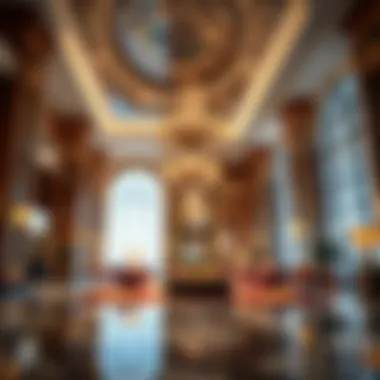Explore Dubai's Hotel Scene: A Complete Guide


Intro
Dubai's hospitality landscape is as diverse as its skyline. The city, renowned for its ambitious architecture and luxury offerings, provides a wide range of accommodations catering to every taste and budget. From opulent five-star resorts that offer extravagant amenities to charming boutique hotels tucked away in bustling neighborhoods, Dubai’s hotels attract visitors seeking both leisure and adventure. This guide aims to navigate through the city’s vibrant hotel scene, illustrating the various types of lodgings available, their special characteristics, and what to consider when choosing accommodation.
As the market continues to thrive, understanding current trends becomes essential for travelers and investors alike. The hospitality sector not only reflects the city’s growth but also harbors investment opportunities worth exploring. Engaging with this continuously evolving segment allows one to appreciate Dubai beyond its famed shopping malls and magnificent towers—its hotels narrate the story of a city that blends tradition with modernity.
This exploration will delve into market trends influencing accommodation choices, investment prospects in the hotel sector, and the distinctive architectural wonders that define the accommodations in Dubai. Hence, whether you are a traveler aspiring for a leisurely retreat or a professional discerning investment options, this guide presents critical insights to enhance your experience in the City of Gold.
Foreword to Dubai's Hospitality Scene
The hospitality industry in Dubai has evolved into a dynamic and multifaceted sector, playing a crucial role in shaping the city as a prominent global destination. This introduction serves to elucidate why understanding Dubai's hospitality scene is essential, especially for potential investors and business operators. With the city constantly welcoming millions of tourists annually, the demand for diverse lodging options offers a wealth of opportunities.
Dubai's hotels are not merely places to rest; they encapsulate the essence of the city—blending luxury, culture, and innovation. Factors such as location, architectural magnificence, and exceptional service set these establishments apart and drive the city’s economy. Moreover, the local government's strategic vision, driven by initiatives like the Dubai Tourism Strategy, has paved the way for a sustained growth trajectory in this sector.
In this context, exploring the trends and the importance of the hotel industry will provide deeper insights into the decisions that investors or visitors should consider.
The Evolution of Dubai's Hotel Industry
The history of Dubai's hotel industry is a tale of remarkable transformation, rooted in the city's rapid ascent from a small trading port to a global metropolis. Initially, the hospitality sector was modest, with a handful of small hotels catering primarily to business travelers and adventurers of the early 20th century.
As the oil boom hit in the 1970s, the need for more sophisticated accommodations increased, leading to the development of larger luxury hotels. Notable brands such as Burj Al Arab and Atlantis, The Palm emerged during this era, symbolizing the new opulence that Dubai sought to offer. In more recent years, there has been a conscious effort to diversify the types of accommodations available to appeal to a broader audience, from luxurious retreats to budget-friendly options.
This evolution reflects not only global tourism trends but also the city's commitment to enhancing its appeal.
Importance of Hotels in Dubai's Economy
Hotels are vital to Dubai's economy, contributing significantly to both employment and revenue generation. The sector creates thousands of jobs across various levels, ensuring that diverse talent is utilized, from front-line staff to managerial roles.
- Economic Contribution: The hospitality sector contributes billions to Dubai's GDP, bolstered by tourism and events, which in turn attract global travelers.
- Supporting Infrastructure: Hotels stimulate surrounding businesses, including restaurants, shops, and entertainment venues. A thriving hotel sector enhances the overall ecosystem, benefiting all
"In Dubai, the realization of hospitality potential goes beyond mere accommodations — it intertwines with the city’s identity, crafting experiences that resonate with visitors long after their departure."
Furthermore, as the city positions itself as a conference hub, hotels equipped with business facilities play a crucial role in establishing Dubai as a premier destination for corporate travel.
Categories of Hotels in Dubai
The landscape of hotels in Dubai showcases a colourful tapestry of options, catering to various tastes and budgets. In this segment, we’ll unfurl the categories of hotels available in this bustling metropolis. Understanding these categories plays a pivotal role in aiding travelers and investors alike to make informed choices. Each segment has its own unique traits and serves different needs. Whether one is in search of plush luxury, business practicality, or wallet-friendly options, Dubai has it covered.
Luxury Hotels
Five-Star Establishments
Five-star hotels in Dubai stand as a testament to opulence and craftsmanship. These establishments offer not just a bed for the night, but an entire experience steeped in elegance. The hallmark of five-star hotels is their parellel service; the goal is to leave guests feeling new heights of comfort. The luxurious ambiance, expansive lobbies, and meticulously designed rooms whisk visitors into a world that is beyond mere lodging.
One notable characteristic of five-star establishments is their personalized service. Imagine stepping into the lobby, greeted by staff who already recall your name and preferences. The unique feature that sets them apart is their commitment to providing bespoke experiences, whether that’s through curated dining options or personalized spa treatments.
However, the associated costs can be steep, which may deter budget-conscious travelers. Still, for those craving indulgence, these establishments are worth the luxury price tag.
Iconic Hotel Brands
When we turn our eyes to the iconic hotel brands, the landscape further brightens. Properties such as the Burj Al Arab or Atlantis, The Palm symbolize more than just places to stay; they represent the pinnacle of luxury, each with its own story and legacy. These brands benefit from robust marketing, leading to a reputation that echoes far beyond the shores of Dubai.
The key characteristic of iconic hotel brands is their brand value and heritage. Guests are not just choosing a room; they're endorsing a legacy of quality and service. One unique aspect is their incredible architecture, where each building becomes an icon in its own right.
The advantage here is clear: investing in such well-established names often guarantees a stellar experience, though it can come with a hefty price tag that reflects their global standing.
Unique Luxury Experiences
In the realm of luxury, unique experiences steal the spotlight. Many hotels offer exclusive activities such as private beach access, rooftop infinity pools with breathtaking views, or desert safari excursions - all designed to create memories that linger. These types of offerings are particularly appealing to those who seek something more than the traditional hotel stay.


These unique experiences are a key draw for travelers who crave adventure coupled with comfort. Think of dining under the stars on a private terrace or personalized guided tours tailored to individual interests. While the allure of these experiences is undeniable, they can sometimes lead to a fragmented overall experience if not seamlessly integrated back into the hotel's offerings.
Mid-Range Hotels
Quality and Affordability
The mid-range hotel segment serves as a bridge between luxury and budget accommodations. It is here where quality meets value, making it popular among the average travelers who still want comfort but don’t wish to break the bank.
The quintessential aspect of mid-range hotels is their balance of quality and affordability. These hotels often come equipped with all the essentials while also offering a touch of class. A unique feature is their ability to provide comfortable rooms, decent dining options, and sometimes even recreational facilities without the sky-high prices seen in five-star counterparts.
However, guests might sacrifice some lavish amenities available in luxury hotels, which could deter guests looking for strictly upscale offerings.
Popular Choices for Business Travelers
Mid-range hotels are especially appealing to business travelers. These establishments tend to provide necessary amenities such as meeting rooms and proximity to business districts. The key characteristic here is convenience; many cater specifically to those attending conferences or business meetings.
For business professionals, features such as high-speed internet, workspace options, and 24-hour room service are vital. Moreover, these hotels often build loyalty programs that benefit frequent travelers, making them a popular choice for those who spend a chunk of their time in Dubai on business. The only downside may be a lack of unique services that luxury hotels provide, but for business-oriented stays, these aspects are often secondary to functionality.
Budget-Friendly Options
Hostels and Guesthouses
The budget-friendly segment is a treasure trove for those wanting to experience Dubai without a hefty price tag. Hostels and guesthouses often boast a communal atmosphere that encourages interaction. They are particularly favored by the younger crowd or solo travelers seeking adventure on a budget.
The main draw is the cost-effectiveness of choosing hostels or guesthouses. Many come with communal kitchens, where guests can whip up their meals. The unique aspect here is the potential for socializing with fellow travelers, sharing stories and tips. However, privacy may be limited, which could be challenging for some.
Economical Chains
When budget constraints are a consideration, economical hotel chains offer an excellent alternative. Chains such as Ibis or Travelodge provide affordable rates with standardized services that guarantee a certain level of quality.
Their main appeal is consistency. Guests can expect a reliable experience, which helps in budget planning. For those on a tight budget, these chains often provide comfort with fewer luxuries, making them a strategic choice. Yet, it is important to keep in mind that charm and uniqueness might be sacrificed for uniformity, which some travelers find unappealing.
In a nutshell, the categories of hotels in Dubai cater to a wide spectrum of visitors, each with their distinct needs and preferences. From opulent five-star experiences to budget-friendly options, there's something for everyone in this dazzling city.
Key Features of Dubai Hotels
In the bustling city of Dubai, hotels go beyond mere shelter; they are an integral part of the experience. The key features of these hotels not only enhance the stay but also contribute significantly to Dubai’s reputation as a top-tier travel destination. From architectural innovations to various amenities, understanding these elements can greatly influence the decision-making process for both travelers and investors alike.
Architectural Innovations
Futuristic Designs
Futuristic designs in Dubai’s hotels stand as a testament to the city’s ambition and creativity. These architectural feats blend advanced technology with striking aesthetics, creating structures that seem to stretch the limits of engineering. Think about the Burj Al Arab; it’s not just a hotel—it’s an iconic sail-shaped silhouette that almost redefines the skyline. The brainchild of skilled architects, its unique design has become synonymous with luxury.
The standout characteristic of these designs is their boldness—the use of glass, steel, and innovative materials signifies cutting-edge construction practices. While these designs often command higher prices, their visual appeal and brand recognition can attract a steady stream of guests looking for something extraordinary. However, the energy consumption and maintenance costs can be considerable, which is a downside that investors might want to factor into their plans.
Cultural Influences
Cultural influences also play a pivotal role in the hotel architecture seen around Dubai. Hotels often infuse elements from both traditional and modern designs, bridging the gap between the past and present. Consider the One&Only Royal Mirage, designed to echo a bygone era of Arabian palaces.
The key characteristic of cultural influences is how they create an immersive experience for guests. They bring a local flavor that aligns with Dubai's heritage while maintaining luxurious standards. The unique feature of including local craftwork in design, such as intricate tile work and traditional motifs, provides an authentic feel that many guests appreciate. On the downside, this focus on culture may sacrifice some modern amenities guests expect, creating a tension between tradition and contemporary luxury.
Amenities and Services
Spa and Wellness Facilities
Wellness has become a vital component of hospitality in Dubai. Spa and wellness facilities are often marketed as a retreat from the bustling city life, designed to offer relaxation and rejuvenation. Consider the Talise Spa at the Burj Al Arab, offering treatments that go beyond the ordinary.
A notable characteristic of spa facilities is their range of holistic services, from aromatherapy to traditional hammam experiences. These offerings make the hotel more appealing, particularly to travelers seeking a restorative break. The unique feature here is the integration of indigenous treatments using local ingredients, enhancing the authenticity of the experience. Nevertheless, high-end spa services may deter budget-conscious travelers who might not see the value in these offerings.


Dining Options
In a cosmopolitan metropolis like Dubai, dining options can make or break a hotel’s allure. Hotels often house diverse restaurants that represent flavors from around the world. A prime example is the culinary scene at Atlantis The Palm, where one can savor dishes from various cultures all under one roof.
The great characteristic of hotel dining scenes is their quality; many hotels employ world-renowned chefs, ensuring high standards in food and service. This cements a hotel's reputation and can significantly influence guest satisfaction. Unique features such as themed dining evenings or rooftop experiences offer memorable moments for guests. Yet, the reliance on such high-profile culinary offerings could pose risks in terms of maintaining consistency and satisfying diverse palates.
Location Advantages
Proximity to Attractions
Location is everything in the hospitality market, and hotels in Dubai excel at capitalizing on their proximity to major attractions. For instance, staying at the Address Downtown offers guests a mere stroll to the Burj Khalifa and The Dubai Mall.
The key trait of this proximity is convenience; guests appreciate being near key sights, enhancing their overall experience and often leading to longer stays. The unique feature here is the potential for increased foot traffic to hotels located strategically close to attractions. However, the downside may include noise and crowds, which could detract from the hotel experience.
Business District Access
For business travelers, easy access to major business districts is a strong draw. Hotels like the Rove Downtown cater specifically to this demographic, situated conveniently next to the Dubai World Trade Centre.
The key characteristic lies in the seamless connectivity to corporate resources, making these hotels ideal for both meetings and leisure. A unique advantage is the provision of state-of-the-art meeting rooms and business services that cater to professionals on the go. Yet, the reliance on corporate clientele may limit appeal to leisure tourists who are looking for more than just convenience during their stay.
"Dubai’s hotels are a blend of luxury, tradition, and innovation, offering something unique for every kind of traveler."
In sum, the key features of Dubai hotels shape the landscape of accommodation options available, offering various paths for investment and visitor satisfaction.
Trends in the Hotel Market
Understanding the trends in the hotel market is essential for both visitors and investors in Dubai. The hospitality industry is not static; it continuously evolves driven by consumer behavior, technological advances, and global events. Insights into current trends can provide valuable guidance on where to invest time and resources, whether you’re looking for a place to unwind or a lucrative opportunity to cultivate.
Sustainability Practices
As the world increasingly prioritizes environmental consciousness, sustainability practices in the hotel sector have gained traction. Hotels in Dubai are adopting eco-friendly measures often starting from the design phase. For example, energy-efficient technologies, waste management systems, and the use of sustainable materials are becoming common. Many establishments now boast solar panels and rainwater harvesting systems. This not only appeals to eco-sensitive travelers but also helps hotels reduce operational costs in the long run.
Hotels actively trading on sustainable practices might find themselves attracting a clientele that prioritizes eco-friendly options, making sustainability not just a trend but a business strategy. These hotels have positioned themselves not merely as places to stay but as contributors to a larger mission of environmental stewardship. Therefore, it's not just about the luxury aspect; it’s about a thoughtful commitment to the planet.
Technological Advancements
The rapid pace of technological advancements is reshaping how guests experience accommodations. With the incorporation of cutting-edge technology, hotels are differentiating themselves from competitors, enhancing guest comfort, and improving operational efficiency. This segment is split into several components; let's take a closer look.
Smart Hotel Technologies
Smart hotel technologies refer to the integration of IoT (Internet of Things) devices that facilitate seamless interactions between guests and hotel services. Imagine a room where you can adjust the lighting, temperature, or even curtains via your smartphone or voice command. This level of control enhances the guest experience significantly, catering to individual preferences.
Moreover, these technologies can optimize energy usage and reduce waste. With smart rooms that adjust their conditions based on occupancy, hotels can see substantial savings on utility bills over time. However, some potential disadvantages include the initial costs for installation and the need for regular updates to keep technology relevant. Still, the demand for comfort and personalization makes smart hotel technologies a popular choice within Dubai’s dynamic hotel market.
Contactless Services
In a world where health and safety have become paramount, contactless services have emerged as a crucial trend. These services allow guests to bypass traditional interactions that often occur during check-in/out processes. The use of mobile apps for check-in, digital room keys, and QR codes for ordering food or requesting amenities have significantly improved the overall guest experience, aligning with today’s hygiene expectations.
One standout characteristic of contactless services is that they enhance efficiency while minimizing waiting times, providing a smoother experience for guests. Although there are concerns about reliance on technology, the advantages—such as increased convenience and safety—are hard to overlook. The growing adoption of contactless solutions is clearly indicative of broader consumer preferences steering the future of hospitality.
"The hotel industry is evolving; those who pivot toward innovation will stand out in the bustling Dubai market."
Investment Opportunities in Dubai's Hotel Sector
Understanding the investment opportunities in Dubai's hotel sector is crucial for anyone looking to make their mark in this vibrant city. Over the years, Dubai has positioned itself as a premier tourist destination, and this has significantly impacted its hospitality industry. The demand for accommodation has surged, and investors have been quick to capitalize on this trend. The hotel's appeal goes beyond just being places for stays; they are pivotal in shaping the urban landscape and boosting the economy.
One key advantage of investing in hotels in Dubai is the high occupancy rates driven by a steady influx of tourists. With events like Expo 2020 and an ever-growing number of international flights, Dubai remains a focal point for business and leisure travelers alike. This backdrop fosters attractive returns on investment, particularly for those who can identify emerging trends in the hospitality sector.
Moreover, investor-friendly policies and incentives set by the government bolster the appeal of the market. Tax exemptions, reduced costs for utilities, and legal protections for foreign investors can make hotel investments much more enticing compared to other countries. Consequently, real estate prices are climbing, and potential investors must remain informed about market shifts.


"In Dubai, the real estate market, especially in hospitality, remains resilient and dynamic. With the right approach and understanding, investors can enjoy substantial benefits from this sector."
Emerging Hotel Brands
Recent years have seen a surge in emerging hotel brands in Dubai. These new players often bring fresh concepts and dynamic styles that cater to the diverse needs of today’s travelers. Unlike established brands, emerging brands often experiment with innovative designs, unique themes and offer unparalleled customer service.
Brands such as Zabeel House by Jumeirah or The House Hotel are redefining what travelers can expect. They focus on lifestyle elements, combining work with play and promoting long-term stays. The increasing popularity of these alternatives reflects a shift in consumer preferences, particularly among millennials and Gen Z who favor more experiential travel options.
Investors looking to back these new brands can find themselves ahead of the curve. Think about how these hotels could satisfy the growing demand for diverse and personalized travel experiences.
Real Estate Investment Trusts (REITs)
For investors who prefer a more indirect approach to hotel investments, Real Estate Investment Trusts (REITs) provide a strategic avenue. In Dubai, several REITs are focused primarily on the hospitality sector, allowing investors to pool resources in purchasing and managing properties.
Investing through REITs has its perks. They allow for greater liquidity compared to direct property investments and present lower barriers to entry for individuals considering entry into the hotel sector. Furthermore, REITs often offer attractive dividends, making them an appealing option for income-seeking investors.
Notably, the Dubai Financial Market hosts several hospitality-focused REITs which create opportunities for investors to diversify their portfolios without concentrating all their funds into a single hotel property. By distributing risks across multiple assets, investors can potentially achieve stable returns even amid market volatility.
In summary, Dubai's hotel sector is rich with investment opportunities, ranging from emerging brands to established REITs. By staying aware of the evolving market and embracing innovative concepts, forward-thinking investors can unlock considerable potential that the hospitality landscape has to offer.
Challenges Facing the Hotel Industry
The hospitality sector in Dubai, characterized by opulence and diversity, faces a range of challenges that could shape its future. Understanding these obstacles is crucial for investors and stakeholders looking to navigate this vibrant yet volatile market. In this section, we will explore the pressing issues of market saturation, regulatory changes, and the impact of global events on Dubai’s hotel industry.
Market Saturation
Dubai's real estate boom has led to an influx of new hotels and accommodations. While competition can often drive innovation and improve service quality, it's a double-edged sword. The rapid increase in hotel inventory has resulted in an oversaturated market where supply exceeds demand in certain segments.
- Diminished Profit Margins: Hotels are compelled to drop their rates to attract guests, which can lead to decreased revenues and profit margins.
- Focus on Differentiation: To survive, hotels must distinguish themselves through unique offerings and experiences, making strategic marketing necessary.
- Rising Operational Costs: As the competition intensifies, operational costs, such as staffing and maintenance, remain high, further squeezing financial resources.
Investors must scrutinize market dynamics carefully. A well-researched understanding of local demand patterns can provide critical insights, allowing for more informed investment decisions.
Regulatory Changes
Regulatory frameworks significantly affect operations in the hotel industry, often dictating how business is conducted. Changes in the law, from zoning requirements to health and safety protocols, can be both an opportunity and a headache.
- Licensing and Compliance: New licensing regulations may emerge, requiring existing players to modify practices to remain compliant. Those who fail may face severe penalties or even closure.
- Sustainability Regulations: The push towards sustainable practices is creating a required shift. Hotels must adapt to these expectations, which can initially be costly but ultimately beneficial in attracting a conscientious clientele.
- Economic Policies: Shifts in taxation policies could impact profitability. Hotels need to stay agile and ready to adapt to new tax structures or incentives offered by the government.
Tension Between Compliance and Profitability
Adhering to regulations might seem burdensome, yet it can also lead to greater trust and business reputation enhancement—attributes that are invaluable in this competitive landscape.
Impact of Global Events
The hotel industry is particularly susceptible to external shocks. Economic downturns, natural disasters, and public health emergencies can drastically alter tourism flows and the overall demand for lodging.
- Economic Recessions: Global economic instability can cut travel budgets, reducing occupancy rates across the city.
- Pandemics: The COVID-19 pandemic is a pertinent example, with many hotels in Dubai forced to shut down or limit operations dramatically. This not only impacts immediate revenues but can also harm long-term brand loyalty.
- Geopolitical Tensions: Regional tensions and conflicts may deter tourists, affecting bookings and occupancy rates.
In uncertain times, adaptability is key for the survival of hotels. They must be prepared not only for recovery strategies but also for potentially
Closure
The hospitality landscape in Dubai is an ever-evolving entity that holds significant importance not only for tourists seeking memorable experiences but also for investors and businesses looking to capitalize on the booming market. The conclusion of this exploration emphasizes several specific elements related to the future of hotels in this vibrant city.
The Future of Hotels in Dubai
Looking ahead, the hotel sector in Dubai is poised for robust growth and transformation. The following key factors will pave the way for the evolution:
- Innovative Developments: With the city being a hub for international tourism, hotels continue to invest in architectural innovation and advanced technologies. For instance, the integration of smart technology within hotel rooms, such as automated lighting and climate control, allows for a more tailored experience for guests.
- Sustainable Practices: Environmental considerations are becoming paramount. Many establishments are embracing sustainability, implementing eco-friendly practices in operations. This not only attracts conscientious travelers but also aligns with global trends shifting toward greener living.
- Diverse Offerings: As the demand for unique experiences increases, hotels are diversifying their offerings to include themed accommodations, wellness retreats, and cultural immersions. This aligns well with the trend of personalization in travel, where guests desire more than just a place to stay.
- Changing Demographics: The influx of millennials and Generation Z travelers also shapes the future. A preference for social spaces, digital engagement, and customized experiences will influence how hotels adapt their services and marketing strategies.
"The only limit to our realization of tomorrow will be our doubts of today." — Franklin D. Roosevelt
As Dubai continues to position itself as a premier global destination, the intertwining roles of hotels in fostering economic growth and attracting diverse visitor demographics remain undeniable. Investors examining this sector should consider the long-term implications of these trends, ensuring that their developments and strategies are well-aligned with the future trajectories of the hospitality industry in Dubai.
In summary, understanding these dynamics is critical for making informed decisions in an exhaustive hotel market. The potential rewards are immense, but vigilance is needed to navigate the industry effectively, ensuring sustainable growth and lasting impact in this remarkable city.







